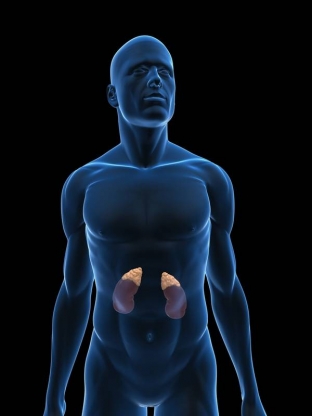Acute adrenal insufficiency, also called hypoadrenal or Addisonian crisis – This is an urgent life-threatening condition in which the production of hormones necessary for the body by the adrenal glands is significantly reduced or completely stopped, as a result of which its important functions are violated. Mortality in this condition is very high: death occurs in more than 50% of cases. That is why it is so necessary for every practicing doctor to know about the tactics of emergency treatment in case of adrenal insufficiency.
Causes of acute adrenal insufficiency
Often, acute adrenal insufficiency develops in patients with an already established diagnosis of chronic adrenal insufficiency, in case of its decompensation. Other reasons that provoke such a state may be & nbsp; decompensation of congenital dysfunction of the adrenal cortex, the development of acute pituitary insufficiency or glucocorticoid withdrawal syndrome. Primary acute or acute adrenal insufficiency – a condition that does not develop against the background of an already existing pathology of the adrenal glands occurs in connection with the development of DIC. In this case, the presence of the following factors plays a role:
- coagulopathy;
- vasculitis;
- Waterhouse-Frideriksen syndrome;
- antiphospholipid syndrome;
- intoxication;
- injuries and burns;
- birth trauma or asphyxia;
- adrenalectomy.
Variants of the course of acute adrenal insufficiency
In the clinical picture of acute adrenal insufficiency, symptoms of the pathology of other organs and systems are combined. Depending on which symptom complex comes to the fore, there are three main types of Addisonian crisis:
- Cardiovascular form, in which the symptoms of circulatory disorders are dominant: hypotension, pulse deficit, collapse.
- Neuro-psychic form – a variant of the predominance of symptoms of CNS damage: meningeal symptoms, severe headache.
- Gastrointestinal – the clinical picture characteristic of the acute abdomen syndrome comes to the fore.
Diagnostic criteria for the development of acute adrenal insufficiency
 Diagnosis of Addisonian crisis is based primarily on the presence of clinical objective signs of the disease, as well as on laboratory data: determining electrolyte imbalance and hormonal panel. A complete blood count will be characterized by such changes: eosinophilia, lymphocytosis, in the absence of concomitant infection – lymphopenia, in the presence of – leukocytosis, significantly elevated hematocrit. In the urine of a patient with Addisonian crisis, hyperuricemia is determined. A biochemical blood test provides detailed information about the electrolyte state, for adrenal insufficiency, the characteristic signs are a decrease in the concentrations of sodium and glucose, and an increase in the concentration of potassium in the blood. At the same time, the sodium / potassium ratio is less than 30. In addition,
Diagnosis of Addisonian crisis is based primarily on the presence of clinical objective signs of the disease, as well as on laboratory data: determining electrolyte imbalance and hormonal panel. A complete blood count will be characterized by such changes: eosinophilia, lymphocytosis, in the absence of concomitant infection – lymphopenia, in the presence of – leukocytosis, significantly elevated hematocrit. In the urine of a patient with Addisonian crisis, hyperuricemia is determined. A biochemical blood test provides detailed information about the electrolyte state, for adrenal insufficiency, the characteristic signs are a decrease in the concentrations of sodium and glucose, and an increase in the concentration of potassium in the blood. At the same time, the sodium / potassium ratio is less than 30. In addition,
If an Addisonian crisis develops, the patient must be hospitalized in the intensive care unit. A urinary catheter and a gastric tube are placed, and venous access is provided. The main task of emergency therapy in Addisonian crisis is the stabilization of hemodynamics. It is necessary to start rehydration as early as possible: about 2-3 liters are injected intravenously. physiological solution. Next, a glucose solution is added to it: on the first day, at least 4 liters of liquid must be injected. The second important step in emergency therapy is hormone replacement therapy. It is necessary to enter the patient 100 mg of hydrocortisone or 4-8 mg of dexamethasone, followed by a transition to a maintenance dose. On the first day, at least 400 mg of hydrocortisone is administered, the introduction stops when the systolic blood pressure rises to 100 mm Hg. or removing the patient from the state of collapse. In addition, the scheme of emergency therapy for acute adrenal insufficiency includes & nbsp; administration of antibiotics, even in the absence of an obvious source of infection.
With a timely start and competent conduct of emergency therapy, the probability of saving the patient's life is quite high. Proper management of patients with chronic adrenal insufficiency, as well as timely diagnosis and treatment of diseases that can lead to adrenal insufficiency – are









Add a comment